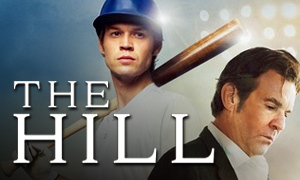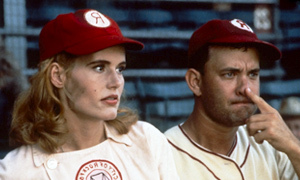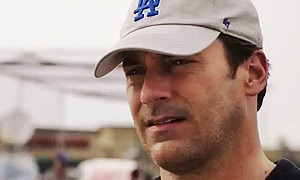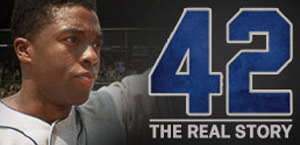"The Hill" vs. the True Story of Rickey Hill
Colin Ford
Born: September 12, 1996
Birthplace:
Nashville, Tennessee, USA
Rickey Hill
Born: August 15, 1956
Birthplace: Fort Worth, Texas, USA
Bio: Outfielder and First Baseman
Did the real Rickey Hill wear leg braces due to a degenerative spinal disease?
Yes. In the movie, a doctor tells Rickey Hill that his bones are rapidly depleting. "It will be a miracle if you ever walk again," the doctor says. This is in line with The Hill true story. Rickey was born with a degenerative spinal disease and doctors had doubts as to whether he would ever walk normally. "My legs when I was born were wrapped around one another, which created one problem, and then the other problem went on up to my back and my spine where I was born with very little disc," said Rickey, who conveyed that the disease ran in his family (Becoming Outlaws Podcast). "My grandmother and my great-grandmother were in wheelchairs at age, I think it was 38 and 42" (Peace, Love and Baseball).
"It was a rough road for a kid growing up, wearing [leg] braces. It made things pretty tough," he told The Athletic. The braces were used to try and get his legs to "move out rather than touching one another." He said that his father would often make the braces since they didn't have money for real ones. Like in the movie, it's true that Rickey Hill's disability, especially his braces, made him the target of bullies.
Rickey told Risen Magazine that he endured several surgeries as a small child. "Zero through four years old, it was really a big obstacle in my life. I can't tell you how many surgeries, I don't know, but there were several, because I didn't remember any of them really, to be honest with you."
As a young boy, did Rickey use sticks to swing at rocks that his brother pitched?
Similar to what's seen in The Hill movie, Rickey said that his dream of becoming a professional baseball player began when he was "a four-year-old with leg braces locked in place whose brother pitched fastballs with rocks" (LinkedIn). In an interview with Risen Magazine, Rickey recalled that he would sometimes spend "16 hours a day" hitting rocks with a stick along the railroad tracks, striking as many as 2,000 rocks. "I hit rocks because it was called free. They were free to hit rocks," he said. "And so if it didn't cost money, I got to do it, one of those deals." He credits all of the time he spent hitting little rocks with sticks (a very difficult thing to do) as helping him a great deal when he started hitting actual baseballs.
Did Rickey Hill grow up in poverty?
Yes. The Hill fact-check confirms that he was raised in poverty in the area of Fort Worth, Texas. He told The Athletic that things for his family got so tough that he was "eating dog food out of the can at times." Director Jeff Celentano commented that "Rickey's life was much more poor than the movie portrays." Rickey said that he would sometimes go door-to-door asking for food (Peace, Love and Baseball).
Was Rickey Hill the son of a pastor?
Yes. In the movie, Dennis Quaid (The Rookie) portrays Rickey Hill's father, James Hill, a strict-but-loving traveling pastor who worries that his son's pursuit of baseball will be too hard on his health and that he will be mocked for his disability. The Rickey Hill true story confirms that he was indeed the son of a traveling Baptist pastor. "Our dad was a Baptist minister and we traveled," he said of his family moving around a lot when he was a child. -RickeyHill.com
Did Rickey Hill start preaching when he was eight years old?
According to Rickey Hill's sister, this part of the movie is very much grounded in reality. She told director Jeff Celentano that Rickey used to often imitate their pastor father. "He used to pull the little stool up and sit right in the front door, and he would preach to the whole family," she said. "He had us captivated." Celentano said that Rickey "knows the Bible back to front."
Did Rickey Hill's life change the moment he ripped off his leg braces and realized he could play without them?
Yes. While exploring The Hill fact vs. fiction, we learned that this was a freeing moment in real life as well. "One day, at eight years old, I busted those braces off," he told CBN's Faithwire. "I never put 'em back on." Ricky Hill's disability was no longer going to restrict him in the same way it had been, nor was it as visibly noticeable without the braces. "When I took the braces off, and I know you probably saw it in the film," Rickey said on Your Biggest Breakthrough. "That happened exactly the way it happened. I yanked them off and I never put them on again."
Did Rickey Hill swing the bat 500 times a day?
Hill said that to perfect his swing, he would "take 500 shadow cuts a day." He also emphasized that he did lots of wind sprints, which helped him to trim his weight. -RickeyHill.com
Was Rickey Hill's father opposed to him pursuing baseball for fear he could suffer further injuries?
Yes. In the Rickey Hill movie, Pastor James Hill (Dennis Quaid) is protective of his son and fears that pursuing baseball could lead to a permanent injury. He also worries that his son will be mocked for his disability. Given his son's thorough knowledge of scripture, he instead hopes that his son will follow in his footsteps and serve the Lord. Rickey said that he did believe he was going to be a Baptist preacher for a time, and he planned to give it his all. "I thought I was going to be the best Baptist preacher," he said. "I was going to be the next Billy Graham." -Risen Magazine
However, his life goal soon shifted to becoming the best baseball player he could be. "I had to let [my father] know that I wanted to make my own choice of what I wanted to do with my life, whether I wanted to be in the ministry or if I wanted to play baseball," said Rickey. "And he actually understood, and we kinda came to terms that way." Rickey said that despite his father never getting to see him play baseball, he still supported him every night after he had a game. "He would come into the room, check on me, make sure I'm okay, and make sure [I was okay with] how I did, always checked on me, which was really a great thing, even though I wasn't behind the pulpit, I was beside a baseball plate. It was in the beginning, yes, it was tough, but it got a lot easier when I was able to do both." -Becoming Outlaws Podcast
Is Rickey Hill's girlfriend in the movie, Gracie Shantz, based on a real person?
From what we can tell, actress Siena Bjornerud's character, Gracie Shantz, was loosely inspired by Rickey's real-life girlfriend Sherran, who he married on August 5, 1975 at age 18. Rickey Hill's father performed the ceremony at home plate in the Expo's stadium. The couple had two children before divorcing in 1986.
Was Rickey Hill injured by going through the wall as he tried to catch a fly ball?
Yes. "I don't like losing and I don't care what it is or what it takes, if I have to die for a fly ball and go through the wall of a baseball game, which I did and did go through the wall. Yes, I broke 38 different bones. Yes, I did. But I just don't believe in anything halfway," said Rickey. -Risen Magazine
Did Rickey Hill find out as a teenager that he had no disc in his spine?
Yes. In speaking to Risen Magazine about the obstacles he faced, Rickey Hill recalled receiving the devastating news. "And then to find out when you're 16 or 17 years old that you have no disc in your spine, really a big disappointment because it changed everything, to me being in pain almost every day playing." Rickey's disease had essentially left him with the spine of a 75-year-old man when he was 17. He told the Baseball Together Podcast that the doctors let him know that his "discs were just crumbling."
Did Rickey Hill approach famed baseball scout Red Murff and convince him to let him play?
Yes. Red Murff is known for discovering and signing Hall of Fame pitcher Nolan Ryan. In the movie, Rickey Hill (Colin Ford) has to impress Red Murff (Scott Glenn) and convince him he deserves a chance to play professional baseball, which is true to Hill's real-life account. What's not shown in the movie is that, according to Hill, he had to climb over a 10-foot wall to get onto the ball field to approach Red Murff, who was standing on top of the rubber of the pitcher's mound talking with several other scouts. Hill discussed his conversation with Red Murff on the Baseball Together Podcast:
I walked up to him and tapped him on the shoulder, and he turned around and he looked at me, and he said, 'Do you know where you're standing?' Well, he's six-foot-six and when he's on the mound, now he's ten feet tall. Think about that a minute. You talk about intimidation, that's intimidation. And so, I said, 'No sir. I don't.' He goes, 'You're standing on The Hill.' ...
And so, I said to him, I said to Red, I said, 'Red, my name's Rickey Hill, and I just wanted to let you know before I leave this camp that it's a shame you're never gonna get to see the best hitter in this camp.' And he said, 'Ya know, if your bat is in tune with your tongue, you're a hell of a hitter.' He said, 'So you honestly believe you're the best hitter here?' And I said, 'No sir, I don't. I know I am.' Well, that just really got him. I mean it really did, that just got him big-time.
Hill was then given the opportunity to play that night. "There is no such thing as no in my book," he told The Athletic. "I hope [people who see the movie] take the fact that even though they told me my disease was going to end me, I wasn't going to accept that. I said I'm not accepting no, and I didn't. I said I would play [baseball] until every tire went flat." According to USA Today, Red Murff called Hill "the best pure hitting prospect he's ever seen." Hill and Red Murff became friends and remained close until Murff's passing in 2008. Hill even spoke at his funeral.
Did the last scene of the movie happen in real life?
Yes. In the final scene of the movie, Rickey Hill faces a nearly impossible challenge. The Hill true story reveals that in real life, after feeling like a freight train had hit him just prior to his last swing, he stood up and didn't think he could keep going. He said that he believes that it was then that God took over. "That's the only way I could do that last thing in the movie that I did was because I was not myself," he told director Jeff Celentano. "It was in me, overtaking that moment in a really amazing way. That's when I really knew … always knew that God is controlling everything." -Risen Magazine
Did Rickey Hill draw a cross in the dirt during the game?
Yes. In answering the question, "How accurate is The Hill movie?" In reality, Rickey Hill drew a cross in the dirt every time he came up to bat. "From the time I was 12 years old, 10 years old, I drew the cross. ... I drew the cross in the dirt and I always stood on the cross every time I got to bat," he told Risen Magazine. "I'm the very last. … No one has ever even done this in baseball ever. No one's ever drawn a cross."
Did Rickey Hill make it to the major leagues?
Hill earned a tryout and was signed by the Montreal Expos in 1975 but was released from the team. He played four seasons in the minors before it became too much on his body. "I knew that I had a limited amount of time," he said, "very limited." He had also kept his spinal disease a secret and was cut after the organization found out. His best season was in 1978 when he had 64 hits and 15 home runs in 224 at-bats with the Grays Harbor Loggers (Baseball Reference). Hall of Famer Andre Dawson, who had been Hill's teammate with the Class A Lethbridge Expos in 1975, told USA Today that "[Hill] could hit, and he had power. He was definitely one of our top prospects."
Despite Rickey Hill's disability and the associated toll on his body that came with competing, he actually played baseball year-round. He played winter ball every year, including in Mexico, Venezuela, and Italy.
Hill went to spring training in 1979 with the San Diego Padres. "I collapsed diving into second base. I had no legs. I didn't walk, I was in traction in the hospital for three months, because back then they didn't have anything to hardly do for you, especially when you have no discs, none" (Baseball Together Podcast). According to USA Today, after his back gave out and his career came to an abrupt end, Hill nearly committed suicide.
He told interviewer Jackie Cooper that after he signed with the Expos in 1975, his brother wrote a 56-page story about his journey. He says that the story was intended to be just for the family, but a guy at church read it and took it to Hollywood in the 1970s. According to Hill, Hollywood wanted to buy his story in 1978, but his father and mother became ill at the same time and he wanted to focus on caring for them. His father came down with pancreatic cancer and his mother developed a brain tumor. "I didn't want to have anything to do with [a movie]," says Hill, "and so I left it alone." It would be roughly 45 years before his story would finally reach the big screen as a feature film.
Was Rickey Hill involved in the making of the movie?
Yes. From screenwriters Scott Marshall Smith (Men of Honor) and Angelo Pizzo (Hoosiers, Rudy, My All-American), The Hill script existed for more than a decade and a half before it was finally made into a movie. Rickey Hill was heavily involved in bringing his own story to the big screen. In fact, according to The Athletic, Hill interviewed more than 40 directors before he settled on Jeff Celentano.
"My brother [Mark] met Rickey in the lobby of a hotel accidentally," says director Jeff Celentano of how he discovered the project. "He was sitting there in another chair overhearing Rickey's conversation about how frustrated he was trying to find the right director and the right people for this movie, and my brother leaned over afterward, and said, 'Sorry for eavesdropping, sir, but I have found your director.'" Hill sent Celentano the script that night and he became obsessed with telling the story. They met in person and Hill was convinced he'd found the right person to helm the project.
However, the movie wouldn't become a reality until 17 years after Hill's first meeting with Celentano. Rickey Hill served as an executive producer, and once filming commenced, he was a regular presence on the set. He said that he wasn't involved in choosing the actors and had left that up to Celentano. "It's an honor to have my story told in this way with Dennis Quaid and Colin Ford starring in The Hill," he said. "I hope audiences find inspiration in their depiction of my life and that it offers encouragement to anyone with a physical disability, because loving what you do is the key to a wonderful life." -RickeyHill.com
How did actor Colin Ford prepare to play Rickey Hill?
In addition to putting on 25 pounds for the role, Colin Ford attended baseball camp for four months to perfect Hill's swing. Ford also learned to mimic Hill's mechanics. -The Athletic
According to director Jeff Celentano, how much of his movie The Hill is based on the Rickey Hill true story?
After reading the script and finding it a little hard to believe, actor Dennis Quaid asked director Jeff Celentano, "Did this kid actually do this? Is this a really true story?" According to Celentano, he validated Hill's whole story. "It's all documented," the director said. "And he really did it." Celentano said that he has collected memorabilia of Rickey and all kinds of different articles on his success. Celentano documented it in a book. -Risen Magazine
What is the state of Rickey Hill's health today?
Hill, who was 67 at the time of the movie's release and working as a financial planner, said that he has a 14-inch rod, six cages, and nine screws in his back that "hold him together" and have given him new life. He has no discs in his spine but thanks to technology, he is able to walk normally. He can still toss a baseball around and even recently threw out the first pitch at a Texas Rangers game. He expressed that, despite his age and health, he would love to try to step up to the plate and hit off of some of the game's star pitchers. -The Athletic



